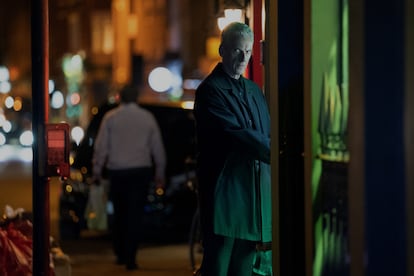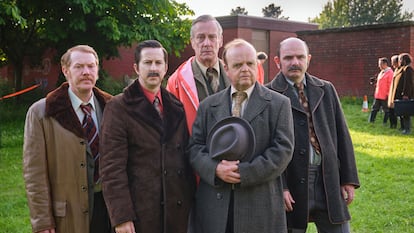Why British detective shows reign supreme
The great mystery of these series is not the crimes being solved, but how each new production of such a hackneyed and exploited genre seems new and bold

Aerial shot of London at night. A large black car moves down the ring road. It is driven by actor Peter Capaldi. He has a couple in the back seat who make fun of his undertaker’s face. Capaldi remains silent, ignores them and smiles without smiling, his eyes half-closed, attentive to everything and detached from the world at the same time. He is still recognizable from his role in Doctor Who: he captained the Tardis between 2013 and 2017, being the 12th actor to play the role. On British TV, being a Doctor is equivalent to being James Bond. It marks an actor’s character, like the priesthood, and is very similar to a pontificate. Once you’ve been a Doctor, you’re a Doctor for life, all subsequent characters are stained.
That’s why it is audacious to have Capaldi wander around a London at night: the viewer expects him to be heading for the Tardis or facing a space-time threat, but Capaldi just drives, smiles without smiling and watches without looking. Who is he, where is he going, what is he hiding and what is this all about? Only a minute has passed, a dozen short shots have followed and nothing has happened, but I’m already inside and I don’t want to get out. Capaldi hasn’t said a word yet and I’m already certain that Criminal Record is a great series.
How do they do that? As a viewer addicted to British detective shows, sometimes I think they cross the border of sleight of hand and enter the realm of magic. Their greatest mystery is not the crimes they solve, but how they manage to make each new series in a genre so codified, hackneyed, exploited, re-masticated and with more platitudes than there are flowers in April and May seem new and audacious.
Every year, when this newspaper asks me for a list of my 10 favorite series, four or five British detective shows always come up. The American shows sometimes bore me, and the critically acclaimed Nordic series make me laugh. The French ones are good to watch if you want to have a nap, and when it comes to Spanish shows, some work and others don’t. But I can’t get enough of British crime shows. I think even the bad ones are good. When I don’t know which series to watch, I take refuge in some dumpy police station in the north of England or the suburbs of Belfast and absorb the adventures of a detective who doesn’t know how to dress, is up to his neck in problems and can’t deal with the weight of their past.

Criminal Record will be on my list of the best series of 2024. It makes the list because of Capaldi’s performance, and Cush Jumbo’s, and because of the mastery with which the plot sustains ambiguity, playing at misdirection in a world of racism and discrimination where few things are what they seem. And perhaps herein lies part of the mystery of why British cop series are always so good: scriptwriters and actors have found in it a masterful way to wade into all of the issues of the world today, and to bring to the public square, from fiction, the anguish and dilemmas of modern-day life.
They’ll say that this is what the noir genre has been doing for a long time, and they’ll be right, but it is rare to find noir that’s so polished, has so many layers, and is so effective at reaching diverse audiences, from the lazy viewer who just want to know who killed her (the conventions of the genre mean that there are many more female victims than male ones), to the intellectual who is on the lookout for the philosophical edges of each sentence.
Through the lens of the police procedural, British society has meditated on the effects of Thatcher’s neoliberal revolution (Happy Valley is the best example, far ahead of Sherwood), the open wounds of IRA terrorism and police corruption (Blue Lights, Line of Duty), the social and cultural decay of picturesque towns (Broadchurch), the crisis of democratic institutions (The Long Shadow and the more political, Collateral, starring Carey Mulligan), the geostrategic insignificance of the United Kingdom in a multipolar world (Vigil) and the epidemic of loneliness and the aging of the population (The Fifth Commandment). In many cases, these shows contribute more wisdom to public debate than op-eds and essays by Oxford professors. The styles range from the frenzied and sometimes banal Jed Mercurio to the proletarian and elegiac poetry of Sally Wainwright. And that’s not to mention the thousands of variations on the Sherlock Holmes theme, patron saint of detectives, invoked in elegant and cheeky series of mass consumption, such as Endeavour and Grantchester.
The degree of commitment and depth also varies greatly, but even the most banal and commercial of these series encourages a second reading and comes with a veneer of irony. The fascinating thing about the genre is that it looks with inquisitiveness, and almost always with discomfort. It disdains Manichaeism and shuns easy solutions and sermons. Conan Doyle may float on the surface, but deep down, there is almost always a Shakespearean drive. Today, the kings, the Yagos, the Hamlets, the Falstaffs and the Lady MacBeths wear uniforms of the Midlands Police or the London Metropolitan Police and drive on one-lane country roads.
Criminal Record by Paul Rutman shoots straight at the racism and poverty of the multicultural suburbs of London (perhaps it is no coincidence that Jim Loach, the son of socially critical director Ken Loach, has directed four episodes). But there is no complacency or doctrine in the story, and that makes it worthy of the police tradition of British television. It is probably, along with The Long Shadow, the last great police procedural. Both confirm that it is a great moment for the genre. No matter how much I look for them, I can’t find any signs of wear or decay. The BBC and private companies continue to reign supreme with their agents and detectives, and no police force in the world can overshadow them.
Sign up for our weekly newsletter to get more English-language news coverage from EL PAÍS USA Edition
Tu suscripción se está usando en otro dispositivo
¿Quieres añadir otro usuario a tu suscripción?
Si continúas leyendo en este dispositivo, no se podrá leer en el otro.
FlechaTu suscripción se está usando en otro dispositivo y solo puedes acceder a EL PAÍS desde un dispositivo a la vez.
Si quieres compartir tu cuenta, cambia tu suscripción a la modalidad Premium, así podrás añadir otro usuario. Cada uno accederá con su propia cuenta de email, lo que os permitirá personalizar vuestra experiencia en EL PAÍS.
¿Tienes una suscripción de empresa? Accede aquí para contratar más cuentas.
En el caso de no saber quién está usando tu cuenta, te recomendamos cambiar tu contraseña aquí.
Si decides continuar compartiendo tu cuenta, este mensaje se mostrará en tu dispositivo y en el de la otra persona que está usando tu cuenta de forma indefinida, afectando a tu experiencia de lectura. Puedes consultar aquí los términos y condiciones de la suscripción digital.









































